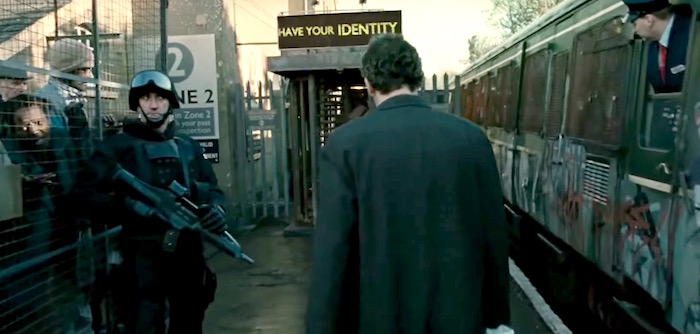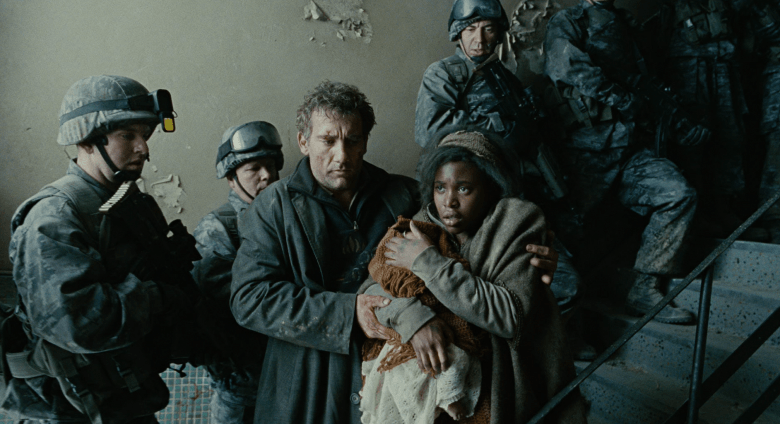10th Anniversary: Children of Men
 Monday, December 26, 2016 at 10:37AM
Monday, December 26, 2016 at 10:37AM David here on the tenth anniversary of a modern masterpiece...

Watching Children of Men at the end of this particular year is an almost surreal experience, because P.D. James’s dystopian vision of the world seems even more feasible than ever. It’s hard to not feel like the new president elect is leading us to a world like the one we glimpse on the video screens, where all cities the world over have been devastated by riot and ruin. It’s hard to not see the xenophobia of the Brexit referendum result in the end of the same video, which declares ‘Only Britain Soldiers On’, as if there’s some value to be had in a country that cages immigrants on train platforms and allows the privileged white man to shut himself off in glacial towers. “You know what it is, Theo?” says Danny Huston’s government minister of his cousin (Clive Owen), when asked how he lives contentedly shut off from the devolution outside. “I just don’t think about it."
Watching Children of Men in a world that seems to be going rapidly backward from the progress people have been fighting for across the last century is despairing during the film’s darkest moments. The selfishness, the cruelty, the hatred and the bigotry of humanity is all on brutal display, political warfare blaring over the top of the intimate human story that underpins the narrative.
This fictional dystopia is still separated from our reality, if by just one thing: every single hope had been stripped away. James’s remarkable conceit is that, some eighteen years before our story begins, the entire world became mysteriously infertile. The youngest human on earth, ‘Baby Diego’, is an arrogant celebrity who has just died - even the youngest that remain, it seems, are fragile. In a civilisation that rests its hopes on the young and their future potential, their absence and frailty turns the world on its head. Set in the midst of this, the introduction of a pregnant woman is an alien sight. So alien that when Theo guides Kee (Clare-Hope Ashitey) through a chaotic refugee camp, no one realises that she’s in labour because it is such an unfamiliar, inconceivable occurrence.
What can’t be taken away from Alfonso Cuarón’s modern masterpiece is its majestic power. The celebrated long takes are so carefully choreographed that they are simultaneously breathtaking in their audaciousness and thrilling in how instinctive they feel. Quite how the visual and sound effects are achieved within these scenes is astonishing. It’s a bravura technical effort from all involved - I’d still call it the finest work Emmanuel Lubezski has ever done - but it is far from being a hollow spectacle. Cuaron uses haunting choral chants on the soundtrack, lending the film an unspecified spirituality - Kee is the Virgin Mary for the dystopian age, albeit with a fouler mouth.

I sat there with tears streaming down my face at the remarkable power of the clarion call that is the baby's innocent cry, as Theo leads Kee through the gaping faces of refugees and soldiers alike. Children of Men takes you to the depths of humanity’s despair and leads you out with the smallest, purest beacon of possibility. As we close 2016, with all the discussion of just how many uncountable things went wrong this year, perhaps it is worth taking a voyage into Cuarón’s masterpiece, as a reminder that even the most desperate times, and the most cynical people, can be changed by the tiniest sliver of hope.



Reader Comments (11)
Thanks for the wonderful write-up of one of my favourite films of all time. I remembered liking this film right away when I viewed it on the big screen at the time of its release. Then I grew to love it as the masterful and auteurial cinematic style of Cuaron made the story even more gripping, vivid, cerebral and affecting.
Certain moments in Children of Men stood out more than others:
- the death of poultry in one of the most discursively violent scenes staged.
- Tavener's "The Lamb" being played like a lost aria in this landscape of despair.
- the ensemble performances from Julianne Moore and Clive Owen to Michael Caine and Clare-Hope Ashitey.
- the cinematography that tells the story more vividly rather than a collection of beautiful shots.
One of the best opening scenes in terms of establishing the movies universe. In the scene above where Theo is leading Kee through the building, he's wearing a faded "London 2012" shirt, which I always thought was a nice touch for a movie released in 2006 but set in the future to have. Shout out to the costume designer.
An all-around flawless movie. I don't think I could find a single fault with it if I tried. As an actress, Julianne Moore generally puts it all "out there," but she's so sexy and enigmatic here. There's also no underestimating her pop of red hair against the bleak visuals—could a brunette have played that role? Definitely not.
This film deserved double-digit Oscar nods. I wish Cuaron had made Gravity first.
This movie has aged extremely well and I think many of us always knew it would. There is real beauty in it. I rewatched a couple of weeks ago and it made me nostalgic to a time Clive Owen looked like he was taking over the silver screen
A true masterpiece.
Companion piece: http://www.vulture.com/2016/12/children-of-men-alfonso-cuaron-c-v-r.html
Best picture of 2006 by a very large margin
"Kee is the Virgin Mary for the dystopian age, albeit with a fouler mouth"
just 'cause mary was a "virgin" doesn't mean she wasn't a trash mouth
A masterwork, period.
Always amazed that it never won Cinematography, and didn't get a nomination for Art Direction.
I read the book and was nervous about any movie adaptation. I shouldn't have worried. When I saw it in the theatre 10 yrs ago I was impressed and swept away by it. Cauron and everyone in front and behind the camera gave it their best. A true masterpiece.
I just wanted to give a shout out to Pam Ferris who got the role of midwife because she impressed Cauron so much when she played Aunt Marge in Harry Potter.